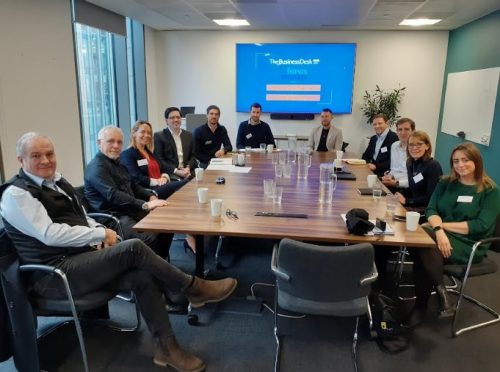Roundtable: Succession and Exit Planning

Every business is focused on the question of “what’s next?” and nowhere is this more important than when looking at the future management and ownership of the company.
A roundtable on Succession and Exit Planning, staged by TheBusinessDesk.com, explored how businesses are preparing for the future and the different strategic choices that are made when this is at the centre of a business’s plans.
The roundtable was chaired by TheBusinessDesk.com’s joint managing director Alex Turner and sponsored and hosted by Forvis Mazars.
Commenting on the biggest challenges in succession and exit planning, Natalie Wright, managing partner Leeds, and head of family business at Forvis Mazars, said every individual’s plan is different depending on personal circumstances.
She said: “The key is being honest about what your objectives are. But sometimes people don’t want to be honest and say ‘I just want to get out to do something else.’ Or: ‘I’m not ready to leave because I don’t know what that something else will be.’ It’s a difficult conversation for people to have.
“Many people are exiting businesses at a younger age than was the case previously. Often that’s not to do nothing or spend all day on the golf course – most want to go on to do something else.”
Alex Baskeyfield, partner – mergers and acquisitions at Forvis Mazars, said people should start planning early for their departure.
He said: “I meet so many people who come and see me and say, ‘Alex I’d really like to retire at age 55, will you help me sell the business?’ And I say, ‘that’s great, how old are you now?’ And they reply, ‘I’m 54.’
“It is possible to run a process in a short time frame but you get better value and it’s an easier process if you allow a couple of years to plan.”
Dan Platt, CEO at Ultimate (Commercial Interiors) Ltd, said he faced a steep learning curve when his two business partners told him they both wanted to retire, initially taking him by surprise.
He said: “I turned to a few trusted contacts within my entrepreneurial network, seeking their advice on how to navigate this unexpected opportunity. Their insights were invaluable in shaping my approach.
“Prior to this, I had never engaged in succession planning. Navigating the buyout required me to manage our large team and maintain stability for our customers and delivery partners, all while transitioning the business after the departure of two founding figures.
“For the first time, I shifted my focus from working in the business to working on it. Engaging in leadership coaching has been transformative.
“The buyout was undoubtedly a significant challenge, particularly as it coincided with our recovery from the impacts of COVID-19, but it also presented an opportunity to redefine our direction.”
Panellists were asked what steps business owners should take to ensure they leave their company in safe hands, and whether passing a firm onto family is necessarily the right solution.
Charles Draper, CEO of Sure Group, said he aimed to build a team who would contribute positively to the business over the long-term, rather than think explicitly about succession.
He said: “It was more about growth planning and seeing people who I knew would be our first team players and in the business for the long-term.
“Giving them skin in the game was the right way to go. It’s not me thinking about this individual, ‘one day he’ll be able to take over the business.’ Instead it’s me thinking, ‘for the next five years he’s going to do really good things so let’s keep him here.'”
Andy Bairstow, chairman of PFF Packaging Group, said both his sons work for him but he did not want them to have to lead the business after he departs.
“For me I need to find a corporate buyer,” he said. “When you’ve put your time in, you want to make sure your family is alright and I’ve got shareholder responsibility too.
“Ultimately an exit is to support the 30 odd years I’ve put in and the sacrifices I made. So for me the structure is to make sure my shareholders and my family come first.”
Adam Johnson, director at Tudor International Freight, whose own father still works at the firm, said: “Certain types of businesses may not be set up for passing onto family.
“Communication is key. If you have a child, do they have a right to be involved in the business? Having that chat early on is important.
“My dad is 78 and he could have walked away years ago. He enjoys work so he’ll keep on doing what he’s doing.
“I’ve seen people who’ve had plans to retire and go travelling. They retire and a year later they drop dead. So there’s no right answer.”
Ellie Jobes, HR director at Bagnalls, said: “You can’t assume the next generation will be interested in running the business. There are no guarantees, it has to be the right people running the business, not because of what their surname might be.
“I think there are plenty of people out there involved in family businesses because the expectation has been there but the desire isn’t there. That’s a recipe for disaster for business and for family relations.”
Paul Mitchell, chairman of The Harris Partnership, said: “You’ve got to create a strong management team, whether it’s family or not it doesn’t matter. My management team are friends. I’ve created enough people in the business who want to drive it forward and that drives growth.
“We’ve acquired three companies in the last 10 years. All of them had no strategy for where they were going to go.
“They were one-man bands with no succession planning. The value of the company was very limited because they had no succession, so you were taking it off their hands to take the liabilities away.
“You don’t want to be in that position, your business has got to have a value to it.”
Samantha Ambler, chief people officer at First Event, pointed out that selling to a major corporate player isn’t attractive to everyone.
She said: “Many people don’t want to go down a big corporate private equity route because of the culture of their business and the employee sentiment.
“It’s not palatable to them – the idea of the baby they created being consumed by a massive behemoth.”










